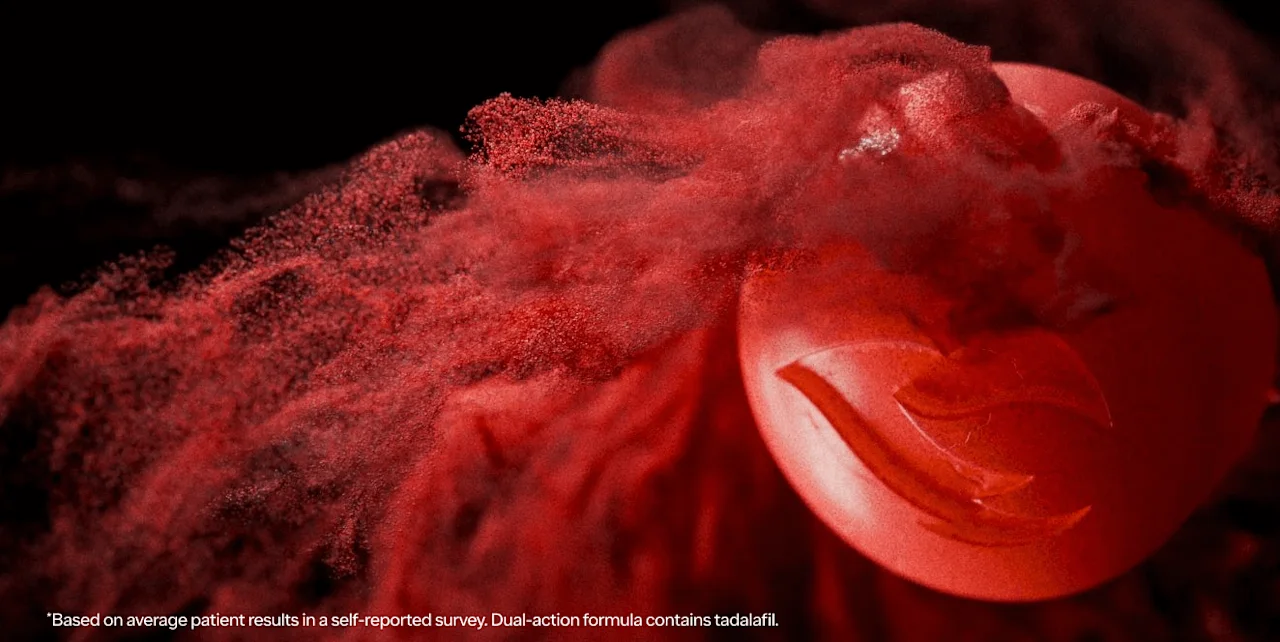Here's what we'll cover
Here's what we'll cover
Here's what we'll cover
Here's a fun fact: The penis contains 4,000 nerve endings in the glans (or head) alone. It's highly sensitive; you're not imagining it. Here's a less fun fact: For various reasons, you can experience a loss of sensation in your penis, which might feel like tingling or numbness (and because of all those nerve endings, you'll probably be tipped off soon after it happens). Read on to find out why this happens and what you can do about it.
What is penile numbness?
Penile numbness is a loss of sensation in the penis. You might feel less sensation than you're used to or no sensation at all. Some people describe the feeling as “pins and needles,” while others report difficulty getting or maintaining an erection (erectile dysfunction) as the main symptom.
Signs and symptoms of penile numbness
If you're experiencing penile numbness, you might have any of the following symptoms:
Loss of sensation in your penis, testicles, or your perineum (the area between the testicles and anus)
A tingling feeling in the penis
Coldness in the penis or testicles
Bluish or purple skin on or around the penis
These symptoms may also result from potentially dangerous conditions and can be a reason to seek medical attention.
What causes penile numbness?
There are several reasons your penis might be numb.
Injury to the penis
Damaged blood vessels or nerves can reduce penis sensitivity. This damage can occur if the penis is somehow injured or after surgery for conditions like prostate cancer (Sharp, 2011).
Some men who ride a bicycle frequently or for long distances can experience penile numbness.
That's because bicycle seats can compress nerves and blood vessels in the area between the penis and the testicles (perineum).
In one study of this phenomenon, 70% of long-distance cyclists had reduced blood flow in their penises, 61% reported numbness in the area, and 19% reported experiencing erectile dysfunction (ED) (Sommer, 2001).
If you find yourself sitting for long stretches in the same position, it can cause damage to the penis or the sensitive tissues around it. Schedule some downtime for a stretch or a walk to limit the pressure on your parts.
In very rare cases, numbness in the penis and erectile dysfunction can result from a nerve or blood vessel in the groin area being pinched. Known as pudendal nerve or artery entrapment, this condition can be treated with surgery, which can resolve the symptoms and restore sensation in the penis (Aoun, 2021).
A side effect of medications
Some medications can cause penile numbness, also known as penile anesthesia. This condition is most commonly seen in people who receive treatment with SSRIs, a type of drug frequently used to treat depression or anxiety.
Sexual problems aren't limited to numbness, though. These medications have been reported to cause priapism (a medical emergency where an erection lasts longer than four hours), as well as erectile dysfunction, numbness in the scrotum, and difficulty ejaculating (Waldinger, 2015).
If you suspect that a medication you are taking might be contributing to numbness in your penis or scrotum, erectile difficulties, or even reduced sexual desire, consult with your healthcare provider before stopping treatment. Abruptly stopping certain medications (including many antidepressants) can cause severe side effects. Your provider can identify alternative treatment options to control your symptoms.
Damage from masturbation or sex
When you masturbate, the sensitive skin on your penis can get chafed or damaged, resulting in dryness, itchiness, pain, or loss of sensation. The same can be true of partnered sex, especially if there isn't enough lubrication. Add a lubricant to the mix and opt for one that is water-based and hypoallergenic. Spot test it before you start to make sure your skin doesn't react to it, and stop using it if you notice a rash or irritation.
Certain sex toys or devices like penis pumps or cock rings (penis constriction rings) have been known to cause damage to the delicate structures in the penis, too. Avoid penis pumps if this is the source of your problem and consider sizing up or skipping the cock rings altogether if it's causing a problem.
If your numbness showed up with a rash, you might have a sensitivity to latex if you've been using condoms. Consider switching to a non-latex brand. If the rash is painful, or if there is a discharge from your penis, then it would be wise to speak with your healthcare provider to rule out an infection that needs to be treated.
Vigorous sex or masturbation can rarely result in a condition known as a penile fracture or broken penis. While you don't have any bones in your penis, there are two flexible tubes that fill with blood during an erection, and bending your penis when it's erect can make the tubes burst. Symptoms include discoloration, pain, bruising, or loss of sensation in the penis. This condition is a medical emergency and may require surgery, so seek medical attention immediately.
Low testosterone
As men age, their testosterone levels drop naturally. While low testosterone doesn't explicitly cause numbness in the penis, it may reduce your sensitivity there and contribute to erectile dysfunction or a loss of interest in sex (low libido).
Other health conditions
Medical conditions that affect or interfere with the nerves—such as diabetes, multiple sclerosis, Peyronie's disease, depression, and prostate cancer—may cause numbness in the penis.
Diabetes is a common condition where a person has high sugar levels in their blood. It can damage the nerves and blood vessels throughout your body and is a well-known contributor to erectile dysfunction or loss of sensation in the penis.
If you are experiencing ED, it's important to get checked out by your healthcare provider to determine if some underlying condition is causing your symptoms so you can get treatment. Other symptoms of diabetes include frequent urination, extreme thirst, and weight loss.
Multiple sclerosis (MS) is a rare disease where the protective layer around the nerves gets worn away. This can make it harder for your nerves to carry signals, which may result in a loss of sensation, including in the penis. Nearly three-quarters of all people with MS report a reduction or loss of sexual function (Hennessey, 1999).
Peyronie's disease is when scar tissue forms on the penis, causing pain and sometimes bending of the penis. Many people with Peyronie's disease experience erectile dysfunction, and the condition can be very difficult both in terms of the discomfort it causes, and in terms of the psychological stress it can cause for a person.
Mental health conditions like depression, stress, and anxiety can interfere with sexual desire and sensations, too.
While prostate cancer on its own doesn't usually cause a loss of sensation in the penis, the treatment for prostate cancer can. Surgery to remove prostate cancer can result in ED immediately after the operation, while ED that results from radiation therapy used to treat prostate cancer can take years to develop (Donovan, 2016).
Treatments for penile numbness
There are many different causes of numbness in the penis, and the treatments depend on the source of the problem.
Managing diseases and medication
Your first move should be a visit to your healthcare provider. They can decide if a testosterone test might be a good idea or if your symptoms might be a sign of diabetes. If you have already been diagnosed, adhering to treatment and keeping your blood sugar levels in check with medication and recommended lifestyle changes can help prevent nerve damage, including to the penis.
If you have noticed pain in your penis, or a bump or curve, it might be a sign of Peyronie's disease. Treatment can include a medication called collagenase clostridium histolyticum (brand name Xiaflex), which breaks down the excess scar tissue in the penis and restores function and sensitivity.
If medication, such as an antidepressant, is causing reduced sensation in your genitals, you can consult with your healthcare provider about switching to another drug. Stopping your treatment on your own is not a good idea. It can be very dangerous. Luckily, there are other treatment options available that can help you treat your condition without causing unwanted side effects, so speak to your provider.
Treating low T
You can get your testosterone levels checked with a simple blood test. Testosterone replacement therapy (TRT) is an FDA-approved way to increase testosterone and treat the symptoms of low testosterone, including low sex drive and reduced sensation. Testosterone therapy can be administered in different ways, including as a:
Treating injuries
If you're a cyclist and suspect all those hours on your bike might be causing penile numbness, you can wear padded bike shorts, stand up frequently when cycling, and change your bike seat to one that puts less pressure on the perineum. A "no-nose" bike seat can protect against sexual dysfunction, according to the National Institute for Occupational Safety and Health (CDC, 2009).
If you are experiencing penile numbness, reach out to your healthcare provider. They can determine the cause of the issue and work with you to find a solution.
DISCLAIMER
If you have any medical questions or concerns, please talk to your healthcare provider. The articles on Health Guide are underpinned by peer-reviewed research and information drawn from medical societies and governmental agencies. However, they are not a substitute for professional medical advice, diagnosis, or treatment.
References
Aoun, F., Mjaess, G., Daher, K., Sakr, G., Chemaly, A. K., Salameh, M., et al. (2021). Laparoscopic treatment of pudendal nerve and artery entrapment improves erectile dysfunction in healthy young males. International Journal of Impotence Research, 33 (1), 1–5. doi: 10.1038/s41443-020-0287-8. Retrieved from https://pubmed.ncbi.nlm.nih.gov/32366984/
CDC - NIOSH Publications and Products. (2014). No-nose Saddles for Preventing Genital Numbness and Sexual Dysfunction from Occupational Bicycling (2009-131). Retrieved from https://www.cdc.gov/niosh/docs/wp-solutions/2009-131/default.html
Donovan, J. L., Hamdy, F. C., Lane, J. A., Mason, M., Metcalfe, C., Walsh, E., et al. (2016). Patient-Reported Outcomes after Monitoring, Surgery, or Radiotherapy for Prostate Cancer. The New England Journal of Medicine , 375(15), 1425–1437. doi: 10.1056/NEJMoa1606221. Retrieved from https://pubmed.ncbi.nlm.nih.gov/27626365/
Sharp, H. J., Swanson, D. A., Patel, H., Gorbatiy, V., Frenzel, J. C., & Frank, S. J. (2011). Subacute penile numbness after brachytherapy for prostate cancer. Brachytherapy, 10 (1), 64–67. doi: 10.1016/j.brachy.2010.02.197. Retrieved from https://mdanderson.elsevierpure.com/en/publications/subacute-penile-numbness-after-brachytherapy-for-prostate-cancer
Seidman, S. N., & Roose, S. P. (2000). The relationship between depression and erectile dysfunction. Current Psychiatry Reports , 2 (3), 201–205. doi: 10.1007/s11920-996-0008-0. Retrieved from https://pubmed.ncbi.nlm.nih.gov/11122956/
Sommer, F., König, D., Graft, C., Schwarzer, U., Bertram, C., Klotz, T., & Engelmann, U. (2001). Impotence and genital numbness in cyclists. International Journal of Sports Medicine, 22 (6), 410–413. doi: 10.1055/s-2001-16248. Retrieved from https://pubmed.ncbi.nlm.nih.gov/11531032/
University of California-Santa Barbara Department of Sociology. (2017). Anatomy of the Penis: SexInfo Online. Retrieved from https://sexinfo.soc.ucsb.edu/article/penis-0
Waldinger, M. D., van Coevorden, R. S., Schweitzer, D. H., & Georgiadis, J. (2015). Penile anesthesia in Post SSRI Sexual Dysfunction (PSSD) responds to low-power laser irradiation: a case study and hypothesis about the role of transient receptor potential (TRP) ion channels. European Journal of Pharmacology , 753 , 263–268. doi: 10.1016/j.ejphar.2014.11.031. Retrieved from https://pubmed.ncbi.nlm.nih.gov/25483212/













